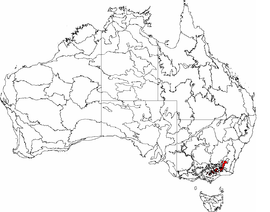Australian Alps
|
Australian Alps Australia |
|||||||||||||
|---|---|---|---|---|---|---|---|---|---|---|---|---|---|

Mount Feathertop, Victoria
|
|||||||||||||

|
|||||||||||||
| Area | 12,330 km2 (4,760.6 sq mi) | ||||||||||||
|
|||||||||||||
The Australian Alps, an interim Australian bioregion, is the highest mountain range in Australia. This range is located in southeastern Australia, and it straddles eastern Victoria, southeastern New South Wales, and the Australian Capital Territory. The Australian Alps contain Australia's only peaks exceeding 2,000 metres (6,600 ft) in elevation above sea level. The Alps are the only bioregion on the Australian mainland in which deep snow falls annually. The Alps comprise an area of 1,232,981 hectares (3,046,760 acres).
The Australian Alps are part of the Great Dividing Range, the series of mountains, hills, and highlands that runs about 3,000 kilometres (1,900 mi) from northern Queensland, through New South Wales, and into the northern part of Victoria. This chain of highlands divides the drainage of the rivers that flow to the east into the Tasman Sea from those that flow west into the drainage of the Murray–Darling basin (and thence to the Southern Ocean) or into inland waters, such as Lake Eyre, which lie below sea level, or else evaporate rapidly. The Great Dividing Range reaches its greatest heights in the Australian Alps.
The Australian Alps consist of two biogeographic subregions: the Snowy Mountains including the Brindabella Range, located in New South Wales and the Australian Capital Territory; and the Victorian Alps, located in Victoria. The latter region is also known as the "High Country", particularly within a cultural or historical context.
Australia's mountains have a reputation of being quite short, despite numerous mountains in the Australian Alps exceeding Mount Narodnaya, the tallest of the Ural Mountains of Russia, while Mount Kosciusko is taller than all but one mountain in eastern Canada, including all mountains on the Eastern side of mainland Canada, and much of the eastern United States of America
...
Wikipedia
